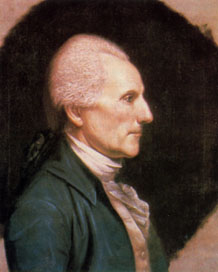| Richard Henry Lee  Born: 20-Jan-1732 Born: 20-Jan-1732
Birthplace: Stratford, VA
Died: 19-Jun-1794
Location of death: Chantilly, VA
Cause of death: unspecified
Remains: Buried, Burnt House Field Cemetery, Mount Pleasant, VA
Gender: Male
Race or Ethnicity: White
Sexual orientation: Straight
Occupation: Politician
Party Affiliation: See Note [1] Nationality: United States
Executive summary: Author of the 10th Amendment American statesman and orator, was born at Stratford, in Westmoreland county, Virginia, on the 20th of January 1732, and was one of six distinguished sons of Thomas Lee (d. 1730), a descendant of an old Cavalier family, the first representative of which in America was Richard Lee, who was a member of the privy council, and early in the reign of Charles I emigrated to Virginia. Richard Henry Lee received an academic education in England, then spent a little time in travel, returned to Virginia in 1752, having come into possession of a fine property left him by his father, and for several years applied himself to varied studies. When twenty-five he was appointed justice of the peace of Westmoreland county, and in the same year was chosen a member of the Virginia House of Burgesses, in which he served from 1758 to 1775. He kept a diffident silence during two sessions, his first speech being in strong opposition to slavery, which he proposed to discourage and eventually to abolish, by imposing a heavy tax on all further importations. He early allied himself with the Patriot or Whig element in Virginia, and in the years immediately preceding the War of Independence was conspicuous as an opponent of the arbitrary measures of the British ministry. In 1768, in a letter to John Dickinson of Pennsylvania, he suggested a private correspondence among the friends of liberty in the different colonies, and in 1773 he became a member of the Virginia Committee of Correspondence.
Lee was one of the delegates from Virginia to the first Continental Congress at Philadelphia in 1774, and prepared the address to the people of British America, and the second address to the people of Great Britain, which are among the most effective papers of the time. In accordance with instructions given by the Virginia House of Burgesses, Lee introduced in Congress, on the 7th of June 1776, the following famous resolutions: (1) "that these united colonies are, and of right ought to be, free and independent states, that they are absolved from all allegiance to the British crown, and that all political connection between them and the state of Great Britain is, and ought to be, totally dissolved"; (2) "that it is expedient to take the most effectual measures for forming foreign alliances"; and (3) "that a plan of confederation be prepared and transmitted to the respective colonies for their consideration and approbation." After debating the first of these resolutions for three days, Congress resolved that the further consideration of it should be postponed until the 1st of July, but that a committee should be appointed to prepare a declaration of independence. The illness of Lee's wife prevented him from being a member of that committee, but his first resolution was adopted on the 2nd of July, and the Declaration of Independence, prepared principally by Thomas Jefferson, was adopted two days later. Lee was in Congress from 1774 to 1780, and was especially prominent in connection with foreign affairs. He was a member of the Virginia House of Delegates in 1777, 1780-1784 and 1786-1787; was in Congress again from 1784 to 1787, being president in 1784-1786; and was one of the first United States senators chosen from Virginia after the adoption of the Federal constitution. Though strongly opposed to the adoption of that constitution, owing to what he regarded as its dangerous infringements upon the independent power of the states, he accepted the place of senator in hope of bringing about amendments, and proposed the Tenth Amendment in substantially the form in which it was adopted. He became a warm supporter of George Washington's administration, and his prejudices against the constitution were largely removed by its working in practice. He retired from public life in 1792, and died at Chantilly, in Westmoreland county, on the 19th of June 1794.
[1] Anti-Federalist.
Father: Thomas Lee
Mother: Hannah Harrison Ludwell
Brother: Philip Ludwell Lee
Sister: Hannah Lee
Brother: Thomas Ludwell
Brother: Francis Lightfoot Lee
Sister: Alice Lee
Brother: William Lee
Brother: Arthur Lee
Wife: Ann Aylett (m. 3-Dec-1757, d. 12-Dec-1768)
Son: Thomas Lee (b. 20-Oct-1758, d. Oct-1805)
Son: Ludwell Lee (b. 13-Oct-1760, d. 23-Mar-1836)
Daughter: Mary Lee (b. 28-Jul-1764, d. 1795)
Daughter: Hannah Lee (b. c. 1766, d. 23-Nov-1802)
Wife: Anne Gaskins Pinckard (m. Jul-1768)
Daughter: Anne Lee (b. 1-Dec-1770, d. 9-Sep-1804)
Daughter: Henrietta Lee (b. 10-Dec-1773, d. c. 1804)
Daughter: Sarah Lee (b. 27-Dec-1775, d. 8-May-1837)
Son: Cassius Lee (b. 18-Aug-1779, d. 8-Jul-1798)
Son: Francis Lightfoot Lee (b. 18-Jun-1782, d. 13-Apr-1850)
High School: Wakefield Academy
US Senator, Virginia (4-Mar-1789 to 8-Oct-1792, resigned)
Delegate to the Continental Congress Virginia (1784-85 and 1787)
Virginia State House of Delegates (1777, 1780, and 1785)
Signatory to the US Declaration of Independence 4-Jul-1776
Delegate to the Continental Congress Virginia (1774-79)
Virginia State House of Delegates (1758-75)
Virginia State Official Justice of the Peace, Westmoreland County, VA (1757)
Proxy Baptism: Mormon St. George, UT (21-Aug-1877)
Slaveowners
Risk Factors: Gout, Arthritis, Smoking
Is the subject of books:
Memoir of the Life of Richard Henry Lee, and his Correspondence, 1825, BY: Richard Henry Lee, DETAILS: (biography)
Richard Henry Lee, Statesman of the Revolution, 1967, BY: Oliver Chitwood, DETAILS: (biography)
Requires Flash 7+ and Javascript.
Do you know something we don't?
Submit a correction or make a comment about this profile
Copyright ©2019 Soylent Communications
|